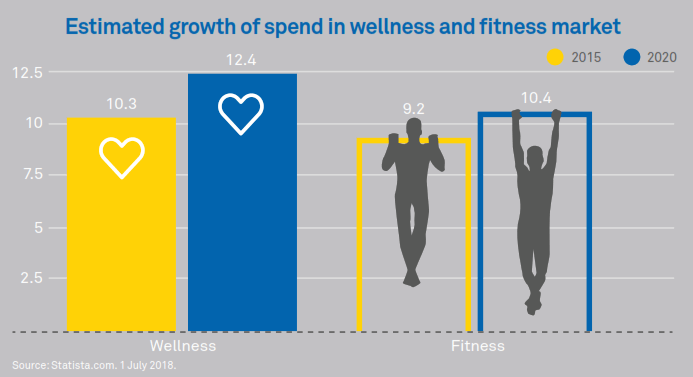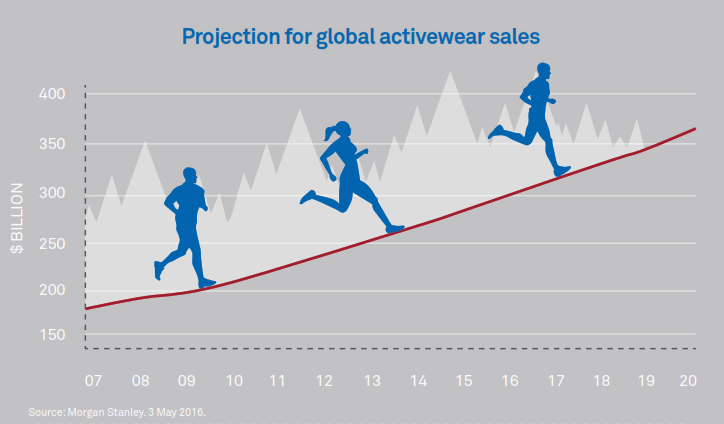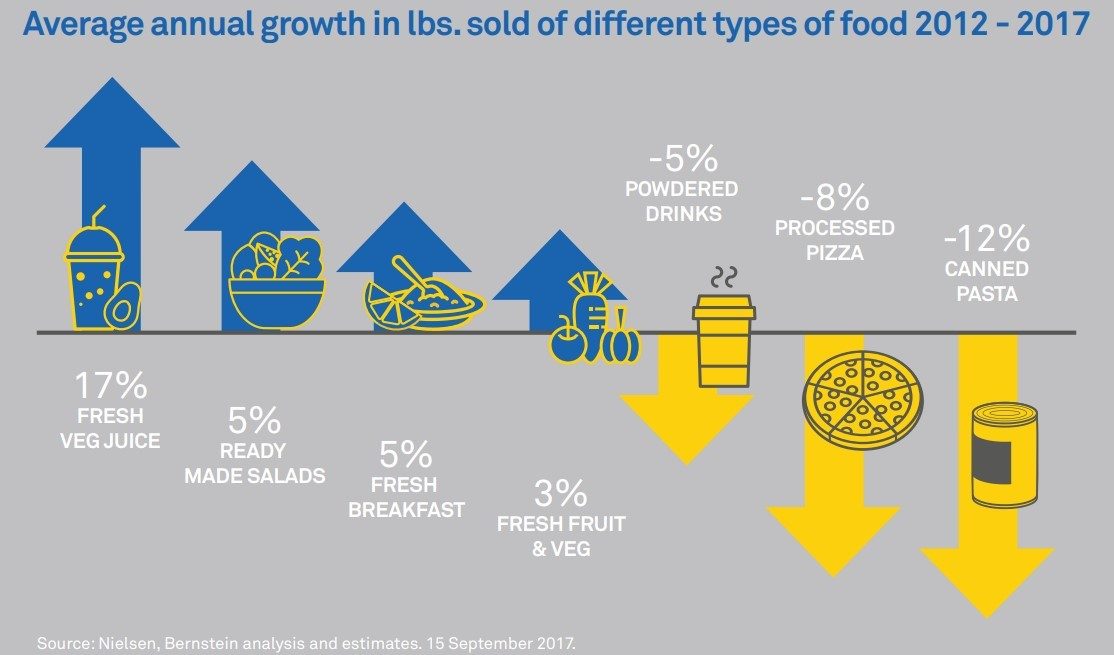Food, fashion and fitness – a trinity of consumer sectors – seem poised for success, largely thanks to the lifestyle habits of Generation Z. Forbes defines Gen Z as those born between 1990 and 2010, making up the generational demographic following millennials. This new cohort of consumers is proving to be more health-conscious, more active on social media, and less brand-loyal than its predecessors.
Social media in particular is a huge motivator for these digital natives, as is the desire to live a healthier life. This has prompted a growing interest in fitness and nutrition – Morgan Stanley indicates that spending on sports apparel alone rose from U.S.$199.1m to U.S.$314.7m between 2009 and 2017, and estimates this could rise to U.S.$365.2m by 2020 – which has clear implications for investors.[1]
Alongside greater demand for athleisure (clothing designed for workouts and other athletic activities which is worn in other settings), marketing techniques are evolving. Traditional sponsorship and celebrity brand ambassadors are being joined by social media influencers. With online platforms allowing people to share their views 24/7, opinions and fashion can change very quickly. Influencers have their fingers on the pulse and are often best placed to maximize product appeal to their followers.
Many major sportswear retailers, such as Adidas, should now be viewed in the context of athleisure, as they offer fashion-led footwear and apparel, rather than clothing focused purely on performance. Indeed, not only is the non-performance part of their businesses almost as large as sporting wear, but it is growing faster too.
Adidas’ move toward to athleisure has resulted in an increased following in China. This is likely to be attributable to Adidas’ less U.S.-centric sponsorship affiliations (including a greater presence in football/soccer) and its stronger social media engagement. Athleisure is essentially street fashion, so social media remains very important from an advertising perspective when considering the Gen Z demographic. Employing social media influencers can offer higher returns than investing in expensive, high-profile star athletes and sports teams. It can also help brands to maintain their appeal, given the transient nature of fashion trends.
Athleisure offers many highly effective touchpoints with the consumer from sports to lifestyle – music and fashion are the standout examples of lifestyle engagements, which explains why it makes sense for sporting goods companies to advertise through trendsetters in these areas.
Form and Function
Alongside increased spending on external appearance, Gen Z also care greatly about their wellbeing. The broader UK wellness and fitness industry is set to reach a value of £22.8bn (U.S.$29.1bn as of August 2018) by 2020, according to Statista, and The Leisure Database Company reveals that one in seven people in the UK now work out on a regular basis.[2]
As the number of gym memberships increases and wellbeing becomes increasingly front-of-mind, the pharmaceutical giants, among others, have started taking an active interest. Over-the-counter brands and other health categories are becoming increasingly important as consumers take more control over decisions about their health. A number of pharmaceutical companies are now investing in their traditional consumer health businesses to highlight categories such as oral health, skin care and nutrition, and they aim to offer different ways to meet the health-care requirements of an increasingly knowledgeable consumer.
As a result of the rapidly shifting health-care landscape, the sector is now experiencing an accelerating pace of change, and as digital spending increasingly starts to reflect consumer preferences for healthier choices, this is potentially offering more fertile ground for investment.
Fresh Food for Thought
The move towards healthier lifestyles is also reflected in the foods we are eating. Consumers are looking to replace processed foods with fresh, healthy alternatives.
For example, Nielsen data demonstrates the increasing popularity of healthy eating among U.S. shoppers. While volumes of heavily manufactured categories like canned pasta, shelf-stable juice and margarine are declining, fresh, natural versions are increasing.
From the filtered beach bodies of Instagram to the contents of supermarket baskets, Gen Z appears to support a multitude of meshed consumer sectors – health, fitness, food and fashion – which interlink in a multitude of ways. The rising number of gym memberships is likely to be motivated by both appearance and health aims, which leads to a boost in healthy eating and more spending on gym clothes. Today, it is increasingly the fashion aspect of clothing that determines the success of an athleisure brand.
More affluent demographic groups, which spend across a range of wellbeing and fitness interests, are key consumers, though those from less wealthy backgrounds, despite perhaps spending less on health clubs and other sporting activities, may also be enticed by the appeal of on-trend fashion at a reasonable price point.
Gen Z’s commitment to healthier choices looks set to drive their consumption choices for the long term, which is likely to make this an exciting and dynamic area for investment.
[1] Quartz: ‘The rise of athleisure is eating into the profits of regular clothes’, May 3, 2016
[2] http://www.leisuredb.com/blog/2016/5/11/press-release-2016-state-of-the-uk-fitness-industry-report
This is a financial promotion. Material in this publication is for general information only. The opinions expressed in this document are those of Newton and should not be construed as investment advice or recommendations for any purchase or sale of any specific security or commodity. Certain information contained herein is based on outside sources believed to be reliable, but its accuracy is not guaranteed. You should consult your advisor to determine whether any particular investment strategy is appropriate. This material is for institutional investors only. Any reference to a specific security, country or sector should not be construed as a recommendation to buy or sell this security, country or sector. Please note that strategy holdings and positioning are subject to change without notice.
Important information
This is a financial promotion. Issued by Newton Investment Management Limited, The Bank of New York Mellon Centre, 160 Queen Victoria Street, London, EC4V 4LA. Newton Investment Management Limited is authorized and regulated by the Financial Conduct Authority, 12 Endeavour Square, London, E20 1JN and is a subsidiary of The Bank of New York Mellon Corporation. 'Newton' and/or 'Newton Investment Management' brand refers to Newton Investment Management Limited. Newton is registered in England No. 01371973. VAT registration number GB: 577 7181 95. Newton is registered with the SEC as an investment adviser under the Investment Advisers Act of 1940. Newton's investment business is described in Form ADV, Part 1 and 2, which can be obtained from the SEC.gov website or obtained upon request. Material in this publication is for general information only. The opinions expressed in this document are those of Newton and should not be construed as investment advice or recommendations for any purchase or sale of any specific security or commodity. Certain information contained herein is based on outside sources believed to be reliable, but its accuracy is not guaranteed. You should consult your advisor to determine whether any particular investment strategy is appropriate. This material is for institutional investors only.
Personnel of certain of our BNY Mellon affiliates may act as: (i) registered representatives of BNY Mellon Securities Corporation (in its capacity as a registered broker-dealer) to offer securities, (ii) officers of the Bank of New York Mellon (a New York chartered bank) to offer bank-maintained collective investment funds, and (iii) Associated Persons of BNY Mellon Securities Corporation (in its capacity as a registered investment adviser) to offer separately managed accounts managed by BNY Mellon Investment Management firms, including Newton and (iv) representatives of Newton Americas, a Division of BNY Mellon Securities Corporation, U.S. Distributor of Newton Investment Management Limited.
Unless you are notified to the contrary, the products and services mentioned are not insured by the FDIC (or by any governmental entity) and are not guaranteed by or obligations of The Bank of New York or any of its affiliates. The Bank of New York assumes no responsibility for the accuracy or completeness of the above data and disclaims all expressed or implied warranties in connection therewith. © 2020 The Bank of New York Company, Inc. All rights reserved.








